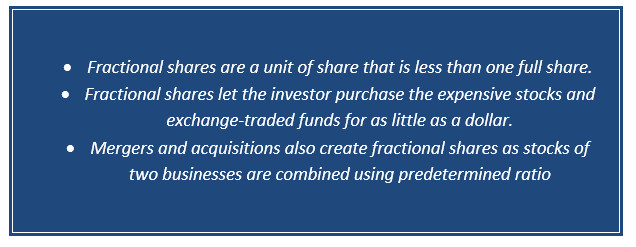Definition
Related Definitions
Fractional Share
What Are Fractional Shares?
Usually investors buy whole share, however if the share cost high they may tend to take a step back as they may either don’t have enough capital to diversify their portfolio or they may not want to invest their entire saving in a particular stock.
Thankfully and helps in diversifying the investor’s portfolio.

Source: Copyright © 2021 Kalkine Media
Fractional Shares Explained
Fractional Shares refers to a unit of share that is less than one full share. It occurs during dividend reinvestment plans (DRIPs), Stock splits, Capital gain, dollar-cost averaging and various similar corporate actions that may result in a partial share of ownership. Generally, fractional shares are traded on the stock market so the only way to sell fractional shares is though brokers, while they have value to investors, making it difficult to sells, thus making the market more illiquid. Mergers and acquisitions generate fractional shares as two businesses combine their shares. Fractional shares are a new concept in investing. A few years ago it was impossible to buy less than one full share.
How a Fractional Share is formed
- Dividend Reinvestment Plans (DRIP)
It is a plan offered by dividend offering corporate or brokerages to allow investors to use dividends they received from company to buy more of the same shares. In some cases, the amount received from dividends is not sufficient to purchase the whole share but rather less than the whole share. Thus, these plans are created to overcome the limitation of the lack of capital to purchase whole shares. Generally, dollar-cost averaging and reinvesting capital gain plans may also result in buying of fractional shares.
- Stock Splits
Stock splits may not always result in an even number of shares. A 5-for-2 stock split would create five shares from every two shares. So the odd number of shareholder would end up with a fractional share after the split.
- Merger & Acquisition (M&A) activity
As the companies combine their new common stock based on a predetermined ratio, mergers and acquisitions may result in fractional shares. It may result in distribution of fractional shares to already existing shareholders of the company.
- Other corporate action
In some cases, when the prices of stocks are too high Brokerage firms intentionally sells fractional shares to customers. Many investors prefer to invest in high prices stocks as these are growing companies that offers high growth potential. Investors may prefer investment in Fractional shares of high prices and reputed companies to diversify their portfolio.
How to Trade Fractional Shares
Fractional shares are not traded in the stock market so the only way to buy and sell them is through a major brokerage firm. The brokerage firms purchase partial shares from other investors to make them whole again. If the fractional shares do not have high demand, selling it will become even more difficult. Investing apps such as Cash App Investing and many more also offer partial shares.

Source: Copyright © 2021 Kalkine Media
Advantages of Fractional Shares
- Investing with smaller amounts of money
If an investor does not have enough capital to invest in a share of a company with high price, fractional shares can make a big difference. They let the investor get into market immediately and start taking advantage from compounding returns.
- Diversify portfolio with low capital
Diversification is one of the basic rules of portfolio construction. Investors diversify their portfolio to mitigate the market risks by owing variety of stocks and ETFs. A fractional share lets investors to invest in different shares with low capital.
- Better dollar cost averaging options
Investors may invest a set amount of money regularly with dollar cost averaging and with time it may offer less per share than the whole share at once as it is focused on a consistent solar amount, not a consistent share amount. Dollar cost averaging works better when investor invests the full amount or else some money has to sit in a cash account before purchasing full share.
Disadvantages of Fractional shares
- Liquidity
As fractional shares are not traded in stock market it might not have immediate asset liquidity. Brokerage firms accumulate enough fractional shares to buy whole share, which may reduce the speed of filing orders. If the demand for fractional shares does not increase, it may take longer to trade fractional shares.
- Limited selection of stocks
Investor may not have chooses of many companies as not every stock is available for fractional investments.
- Shareholders rights
With fractional shares you may not be able to exercise voting rights, depending on broker. For example, Robinhood may accumulate fraction shares into whole shares to report votes to companies.
- Transfers
Some brokers may not allow investors to transfer fractional shares to other brokers; rather they may transfer full shares and sell fractional shares to offer cash to investors. It may be inconvenient for the investors and they may able to repurchase shares quickly at new brokerage firm. If the value of fractional shares increases, selling it may have unintended tax consequences.
- Dividends
As fractional shares represent a portion of whole share, fractional shareholder will receive the portion of stocks’ dividends. For example, if the dividend payout is US $1, and investor has half of a share, they will receive US $0.50 as a payout.
